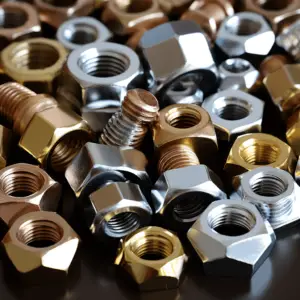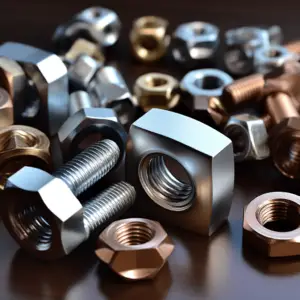Nut Fasteners are a part of industrial fasteners with laced holes. Most nuts are used with a mating bolt to secure a tool’s many features. A union of nuts threads’ grip and a small bolt pull keep the nut and bolt together. Are you having trouble distinguishing between a stop and a lock nut?
A stop nut is a nut with a plastic insert. The insert is mainly made of nylon. On the other hand, a lock nut is a nut with a deformed thread near the nut’s end. Both the stop and lock nut have been designed to resist loosening when exposed to vibration.
Stop nuts are significantly less expensive than lock nuts. However, when compared to lock nuts, these nuts will not hold up well in high-temperature places like the engine.
Table of Contents
Alternatives Locking/Anti-Vibration Fastening Solutions

When seeking to avoid self-loosening, additional anti-vibration fasteners such as Locking Washers, especially the popular Nord-lock Washers, which feature a unique wedge-locking solution, are also a possibility.
Another anti-vibration solution is AccuLock Thread Locking Patches, which are meant to increase the friction between the threads of fasteners, boosting the effectiveness and lifetime of the components while also reducing thread wear and galling.
Things to Know Before Selecting the Right Nut Fasteners for Your Needs
Below are some of the things you should put into consideration before selecting the best nut fasteners for your needs:
-
Check the Application
Before you start looking for the correct nut fastener, you should first understand its use. Industrial fasteners have a wide range of applications. Do you have any questions concerning the application you require? We took care of that for you. It will depend on the application, whether you utilize mild steel or exotic materials.
Another suggestion is to learn how to use standards that always address fasteners and their applications. ASTM A307, for example, covers laced rod and carbon steel bolts up to 60,000 PSI pliant strength. Knowing how to use a nut fastener will save you time when phoning your provider.
-
Select the Correct Supplier
Picking the appropriate nut fastener isn’t a simple task. There are numerous processes and aspects to consider, and finding the correct provider is a crucial element of the process.
If this is your first time buying a nut fastener, seek a provider who can assist you with their knowledge and experience. When selecting any fastener, having a reliable provider is critical.
Various dealers in the sector sell counterfeit goods. The majority of them may be found both online and in physical stores. Choose a provider with whom you are familiar or who can assist you in the event of a problem. After you’ve found a seller, you can go ahead and choose the proper nut fastener from their inventory.
-
Type of Nuts
When choosing the proper nut, you must evaluate the nut’s type. Nuts are available in various materials, sizes, groove types, and shapes.
The nut selection is limited due to the range of bolts available. Bolt threads and size should match the nuts. What types of nuts may you come across? Aside from the previously mentioned stop nuts and lock nuts, various other nuts are available in the market. This include:
-
Coupling Nuts
Do you want to connect two bolts? A coupling nut can assist you in this endeavor. The industrial fastener contributes to the lengthening of installations.
-
Castle Nuts
These nuts have a turret-like appearance and are used on a wall. When fixed, the turret-like construction leaves gaps that align with the bolt. The snug fit keeps the bolt firmly in place. So you won’t have to worry about the bolts loosening all the time.
-
Wingnuts
These nuts are made to be handled by hand. They have wing-like protrusions that help the hand grip the nut better.
-
Flange Nuts
Flange nuts have an external washer. The washer aids in weight distribution.
-
Square Nuts
Its square shape makes it easily identifiable. The shape increases a fastener’s surface area and friction. As a result, it is not easy to loosen.
-
Slotted Nuts
They’re made to work with a locking mechanism within a safety pin or cotton pin. This ensures a tighter, more secure fit. They can be of any type, but the slots distinguish them from others.
-
Hex nuts
A hexagonal nut is the most likely type of nut that almost everyone has come across. The hex nut has a wide range of applications. It is both a commercial and a domestic fastener.
-
Type of Material Used To Make the Nut

Varying materials have different properties depending on your fixing requirements. Nuts used in cold or acidic environments cannot be the same as those used in boilers. Steel nuts are the most prevalent form of nut. However, nut manufacturers have come up with a variety of steel nuts to suit any situation:
-
Carbon Steel
Carbon steel offers the broadest range of workability. Therefore, it’s no surprise that it’s the most common material for nuts. They have a wide variety of strength properties.
Massive hex nuts can be made from low carbon steel, such as ASTM 307 Grade B. Treatment can increase the nut’s strength, allowing it to withstand additional force. Thanks to the treatment, they can now work in valves, high-pressure systems, and flanges.
-
Steel Alloys
These are produced out of alloys of steel. The alloys boost the strength of the steel. They have high power, but they are also fragile. If this is your preferred steel, proceed with caution. A hydrogen reaction could cause brittleness. To avoid this, use zinc-coated steel bolts.
What is the Difference between Nylon Insert Lock Nuts and Hex Nuts?
Nylon insert lock nuts are comparable to standard finished hex nuts, but they have a nylon insert lock to keep the nut in place. When a nylon insert lock nut is put on a screw or bolt, the nylon material wraps around the threads, preventing the connection from vibration loosening.
